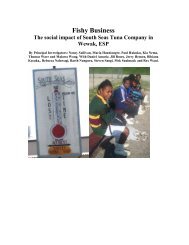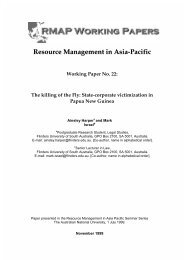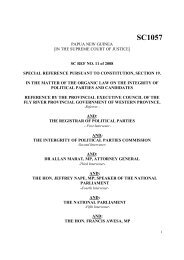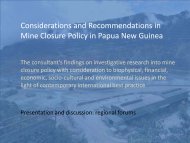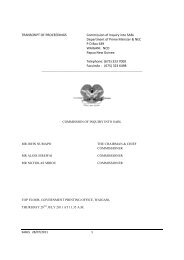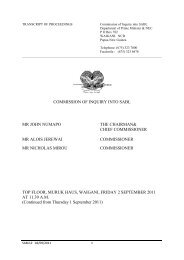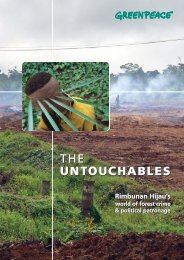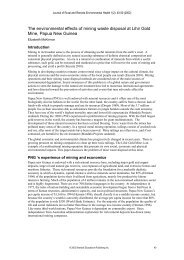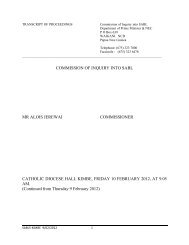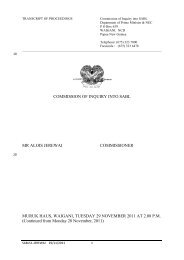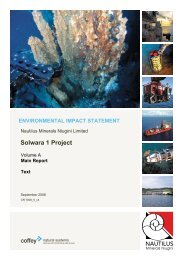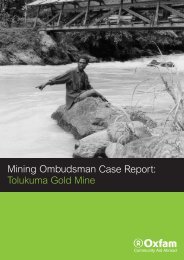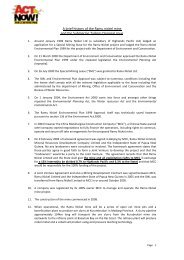Oxfam Australia and CAER: The right to decide
Oxfam Australia and CAER: The right to decide
Oxfam Australia and CAER: The right to decide
Create successful ePaper yourself
Turn your PDF publications into a flip-book with our unique Google optimized e-Paper software.
2. mining <strong>and</strong> free,<br />
prior <strong>and</strong> informed consent —<br />
legal <strong>and</strong> policy perspectives<br />
<strong>The</strong> United Nations Declaration on the Rights of Indigenous<br />
Peoples (UNDRIP) 5 promotes the <strong>right</strong> of indigenous peoples<br />
<strong>to</strong> give or deny their Free, Prior <strong>and</strong> Informed Consent (FPIC)<br />
for projects that affect them, their l<strong>and</strong> <strong>and</strong> their natural<br />
resources. <strong>The</strong> UNDRIP requires that the FPIC of indigenous<br />
peoples be obtained in matters of fundamental importance<br />
for their <strong>right</strong>s, survival, dignity <strong>and</strong> wellbeing. 6<br />
<strong>The</strong> <strong>right</strong> <strong>to</strong> FPIC is also articulated in ILO Indigenous <strong>and</strong><br />
Tribal Peoples Convention 169 (ILO 169) 7 which deals with the<br />
<strong>right</strong>s of indigenous <strong>and</strong> tribal peoples. It is also affirmed<br />
in the jurisprudence of international <strong>and</strong> regional human<br />
<strong>right</strong>s bodies, which have interpreted the major human <strong>right</strong>s<br />
treaties as embodying the requirement for FPIC in relation <strong>to</strong><br />
mining projects on the terri<strong>to</strong>ry of indigenous peoples.<br />
In the case of mining, the UNDRIP says: “States shall consult<br />
<strong>and</strong> cooperate in good faith with the indigenous peoples<br />
concerned through their own representative institutions in<br />
order <strong>to</strong> obtain their free <strong>and</strong> informed consent prior <strong>to</strong> the<br />
approval of any project affecting their l<strong>and</strong>s or terri<strong>to</strong>ries<br />
<strong>and</strong> other resources, particularly in connection with the<br />
development, utilisation or exploitation of mineral, water or<br />
other resources.” 8<br />
However, FPIC is not only a concern for states (although<br />
it must be acknowledged that some states do not even<br />
recognise the status of some people as indigenous).<br />
Companies must also respect this <strong>right</strong>. <strong>The</strong> responsibility of<br />
companies <strong>to</strong> respect all internationally recognised human<br />
<strong>right</strong>s is articulated in various human <strong>right</strong>s instruments,<br />
including the United Nations Protect, Respect <strong>and</strong> Remedy<br />
Framework, 9 which is the global st<strong>and</strong>ard of expected<br />
conduct for all businesses wherever they operate. This<br />
corporate responsibility <strong>to</strong> respect indigenous peoples’<br />
internationally recognised <strong>right</strong>s exists in addition <strong>to</strong> the<br />
state responsibility <strong>to</strong> guarantee their protection.<br />
Other stakeholders also recognise the <strong>right</strong> of indigenous<br />
peoples <strong>to</strong> FPIC. <strong>The</strong> World Bank’s private sec<strong>to</strong>r arm, the<br />
International Finance Corporation (IFC), for example, now<br />
requires its clients <strong>to</strong> obtain the FPIC of affected indigenous<br />
peoples in some circumstances, including when a project<br />
may result in adverse impacts <strong>and</strong> when the relocation of<br />
indigenous peoples from communal l<strong>and</strong> is unavoidable. 10<br />
<strong>The</strong> circumstances elaborated clearly extend <strong>to</strong> mining<br />
projects in or near indigenous peoples’ terri<strong>to</strong>ries. <strong>The</strong> IFC<br />
sets the st<strong>and</strong>ard for the Equa<strong>to</strong>r Principles Banks, <strong>and</strong><br />
influences other st<strong>and</strong>ards such as the OECD Guidelines<br />
for Multinational Enterprises <strong>and</strong> the lending practices of<br />
some export credit agencies such as <strong>Australia</strong>’s Export<br />
Finance <strong>and</strong> Insurance Corporation. As the IFC itself has<br />
said, increasingly other international finance institutions,<br />
industry associations <strong>and</strong> round tables have adopted or are<br />
considering adopting FPIC. 11<br />
Research undertaken by <strong>Oxfam</strong> America shows that some<br />
non-<strong>Australia</strong>n multinational mining, oil <strong>and</strong> gas companies<br />
also make explicit commitments <strong>to</strong> FPIC. 12<br />
<strong>The</strong> <strong>right</strong> <strong>to</strong> FPIC must be unders<strong>to</strong>od within the broader<br />
context of the <strong>right</strong>s of indigenous peoples <strong>to</strong> maintain <strong>and</strong><br />
strengthen their own institutions, cultures <strong>and</strong> traditions,<br />
<strong>and</strong> <strong>to</strong> pursue their development in keeping with their own<br />
needs <strong>and</strong> aspirations. 13 Additionally, indigenous peoples’<br />
<strong>right</strong> <strong>to</strong> FPIC is based on their <strong>right</strong> <strong>to</strong> self-determination.<br />
FPIC is an essential safeguard for the realisation of selfdetermined<br />
development in the social, cultural <strong>and</strong> economic<br />
spheres.<br />
Indigenous peoples’ collective <strong>right</strong> <strong>to</strong> FPIC is an example of<br />
a specific <strong>right</strong> of indigenous peoples but one that is based<br />
on universal <strong>right</strong>s, including those in the International<br />
Covenant on Economic, Social <strong>and</strong> Cultural Rights <strong>and</strong><br />
International Covenant on Civil <strong>and</strong> Political Rights. FPIC<br />
recognises indigenous peoples’ specific <strong>right</strong> <strong>to</strong> l<strong>and</strong> <strong>and</strong><br />
the cultural significance of l<strong>and</strong>, as well as a his<strong>to</strong>rical lack<br />
of participation in decision-making by indigenous peoples<br />
<strong>and</strong> their political marginalisation. It is also, as noted above,<br />
a fundamental element of their <strong>right</strong> as peoples <strong>to</strong> selfdetermination.<br />
FPIC requires that indigenous peoples <strong>and</strong> local communities<br />
must be adequately informed about mining, oil <strong>and</strong> gas<br />
projects in a timely manner, <strong>and</strong> given the opportunity <strong>to</strong><br />
approve (or reject) projects prior <strong>to</strong> the commencement<br />
of operations. This includes participation in setting the<br />
terms <strong>and</strong> conditions that address the economic, social<br />
<strong>and</strong> environmental impacts of all phases of extraction <strong>and</strong><br />
post-extraction operations. 14 FPIC is a specific <strong>right</strong> held by<br />
indigenous peoples only. However, it also represents bestpractice<br />
sustainable development <strong>and</strong> should therefore<br />
guide mining, oil <strong>and</strong> gas company practice when consulting<br />
<strong>and</strong> negotiating with all affected communities — both<br />
indigenous <strong>and</strong> non-indigenous.<br />
5. <strong>The</strong> UNDRIP is an important human <strong>right</strong>s instrument even though it is not legally binding. <strong>The</strong> UNDRIP represents the commitment of governments <strong>to</strong> abide by certain<br />
principles <strong>and</strong> st<strong>and</strong>ards, is based on human <strong>right</strong>s enshrined in other legally binding instruments <strong>and</strong> represents the aspirations of indigenous peoples globally.<br />
6. Expert Mechanism Advice No. 2, 2011: Indigenous peoples <strong>and</strong> the <strong>right</strong> <strong>to</strong> participate in decision-making.<br />
7. www.ilo.org/indigenous/Conventions/no169/lang--en/index.htm<br />
8. United Nations Declaration on the Rights of Indigenous Peoples, article 32(2)<br />
9. www.reports-<strong>and</strong>-materials.org/Ruggie-report-7-Apr-2008.pdf<br />
10. International Finance Corporation, Performance St<strong>and</strong>ard 7 Indigenous Peoples, January 2012.<br />
11. International Finance Corporation, Progress report on IFC’s policy <strong>and</strong> performance st<strong>and</strong>ards on social <strong>and</strong> environmental sustainability, <strong>and</strong> Access <strong>to</strong> Information Policy<br />
review <strong>and</strong> update process, December 2010.<br />
12. Marianne Voss <strong>and</strong> Emily Greenspan, ‘Community consent index: Oil, gas <strong>and</strong> mining company public positions on Free, Prior, <strong>and</strong> Informed Consent (FPIC)’, <strong>Oxfam</strong> America<br />
Research Backgrounder series, 2012.<br />
13. Frequently asked questions: Declaration on the Rights of Indigenous Peoples: www.un.org/esa/socdev/unpfii/documents/FAQsindigenousdeclaration.pdf<br />
14. Marianne Voss <strong>and</strong> Emily Greenspan, ‘Community consent index: Oil, gas <strong>and</strong> mining company public positions on Free, Prior, <strong>and</strong> Informed Consent (FPIC)’, <strong>Oxfam</strong> America<br />
Research Backgrounder series, 2012.<br />
5



